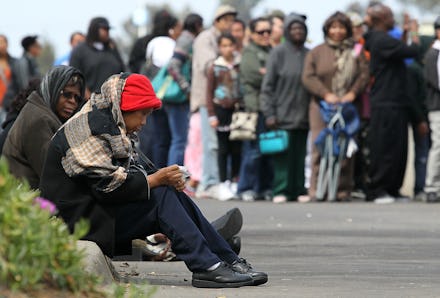The Biggest Conservative Lie We Need to Stop Telling About Welfare

The classic debate between liberals and conservatives over government assistance to the poor in America centers on whether it discourages work. Since the Reagan era, conservatives have argued that welfare encourages laziness and perpetual dependence on government. The liberal response has been that these fears are unfounded.
For the past three decades, the right has largely been winning that battle. Liberals have typically taken a defensive posture in public policy debates. In 1996, Bill Clinton gutted welfare in accordance with conservative ideas about the need to limit the government's helping hand. After the Great Recession strained state budgets across the country, Supplemental Nutrition Assistance Program benefits (food stamps) have routinely been the first thing to hit the chopping block.
But recent studies suggest the dynamics of that debate may be obsolete. There's an increasing body of evidence that social welfare programs that assist the poor do the opposite of what conservatives have been arguing. They actually encourage entrepreneurialism, rather than breed dependency.
The evidence: In the Atlantic, Walter Frick brought together compelling empirical studies demonstrating the ways in which government aid has encouraged people to take risks in the business world. Two in particular merit a closer look.
In 2014, Gareth Olds at Harvard Business School published a paper illustrating that bigger safety nets corresponded with more entrepreneurship. In his study he found states that expanded SNAP benefits in the 2000s increased the likelihood that a newly eligible household would own an incorporated business by over 15%. One particularly fascinating element of the findings was that greater business ownership was among households that were eligible for SNAP benefits but did not actually end up signing up for them. It was the knowledge that they had government aid to fall back on that encouraged their business endeavors. By decreasing the costs of failure, people are emboldened to pursue risky ventures.
Frick points out another Olds study that found that the actual receipt of aid encouraged entrepreneurialism. He found that recipients of the Children's Health Insurance Program — government-backed health care for children in low-income families who exceed the threshold for insurance through Medicaid — boosted people's inclination to opt for their own enterprise. Receiving CHIP increased the rate of business ownership by a remarkable 31%. Again, mitigating the risk of hardship fosters a greater propensity for going it alone.
This talk of entrepreneurial activity among people who are eligible for public aid can be counterintuitive; launching a business typically requires capital that poorer people rarely have access to. But in reality, business-owning households can be found across the income spectrum, and many don't make much money at all.
Olds found that 12% of households with incorporated businesses are enrolled in a public assistance program, not including "earned" benefits such as Social Security, Medicare or veteran's benefits. That's less than the non-business-owning population, which clocks in at around 30%, but it's still a substantial number. Without aid, or the promise of it, it's clear that the business-owning population would have fewer people willing to strike out on their own.
The enterprise benefits of assistance: These studies buttress other findings by social scientists that show that the poor use benefits in surprising ways. A 2013 paper by Christopher Blattman of Columbia University, Nathan Fiala of the German Institute for Economic Research and Sebastian Martinez from the International Monetary Fund found that cash transfers to the poor in Uganda resulted in people investing most their money in "skills and business assets," and becoming "65% more likely to practice a skilled trade," which in turn created a significant bump in their income.
These aren't the first studies to suggest that conservative hysteria over government assistance is misguided, but they drive home how backward it is. Assisting those in need is not only the moral obligation of a civilized society, it also helps create the an environment more conducive to ambition.